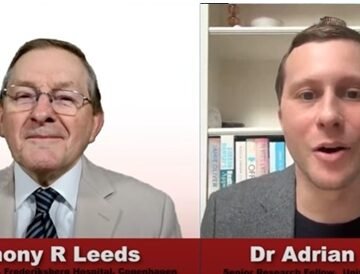Professor Mike Lean, University of Glasgow
Long COVID is defined as a condition where symptoms continue for 12 weeks or more after an acute infection with COVID-19 virus. Long COVID can affect several systems in the body causing a variety of symptoms. Common symptoms include mental and physical fatigue, pain, ‘brain fog’, anxiety and depression. There are no specific treatments for the condition and medical care provides guidance on how to manage symptoms.
The individual, national and global burden of Long COVID is huge. For individuals, symptoms may reduce their ability to work and function fully within society, or in some cases may prevent work altogether which compounds the misery affected by individuals on top of their symptoms. The large numbers of people affected by Long Covid, between two and ten per cent of many populations and perhaps up to 40% of others, reduces the size and effectiveness of the workforce with dire consequences for national economies.
Against this grim background Professor Mike Lean and his colleagues at the University of Glasgow were inspired to see if the weight management programme previously tested and proven to deliver diabetes remission, could be of benefit in people with Long Covid. Many of those affected by Long Covid had gained weight during and after the infection (two thirds of those in this study gained more than 5kg) and were affected by many of the problems associated with weight gain (high blood pressure, sleep disturbance, a tendency towards diabetes, joint pain etc) so it seemed logical to see whether correcting the overweight state would improve symptoms.
Adults with Long Covid were randomized to either usual care (guidance on how to manage their symptoms) or a weight loss programme (an 850kcal/d TDR total diet replacement – formula food diet) for 12 weeks followed by step-wise reintroduction of conventional food and support to achieve weight maintenance. The people in the control group were offered the TDR diet after six months. All participants had previously chosen which of their symptoms most troubled them and which they would most like to improve. Over half chose fatigue, 16% chose breathlessness and 12% chose pain. Body weight was reduced by just under 10kg after 3 months in the diet-treated group and was on average weight-loss was just over 10kg at 6 months (control participants lost just under 1kg at 3 months and just over 1kg at 6 months). The principal symptom was significantly improved at three months and remained improved, though not to the same extent at six months. This pattern was reported with regard to all symptoms in the diet treated group, in whom fewer missed hours of work were reported.
Though this is the first such study of weight loss in Long Covid and will be followed by larger scale trials to confirm and improve the understanding of how this helps, Prof Lean said that even at this early stage there would be merit in taking action now rather than waiting 5 years for more results. He said that it was important to be clear that weight loss is not a treatment for Long Covid, but weight loss is now shown to improve the common symptoms of Long Covid.
Those who have Long Covid and who are overweight or who have obesity may wish to look for any proven and safe weight-loss method to achieve a ten kg weight loss as was achieved in this trial, but are advised to consult their medical practitioner first, where possible.
Previous health chats with Prof Lean
United States of America Long Covid Basics
Accommodating Employees with COVID-19 or Long COVID
Canada Post COVID-19 condition (long COVID)
Post-COVID-19 Condition and Its Continued Impact on Individuals and Society
Pakistan Long COVID in Pakistan: a cross-sectional analysis of health and psychosocial outcomes



![Long term benefits of obesity surgery [part 2] Mr Pratik Sufi](https://bittertruth.uk/wp-content/uploads/2025/06/sufi-360x280.jpg)




















